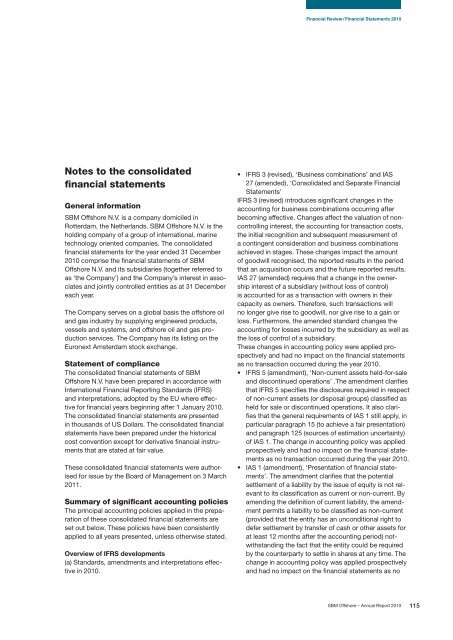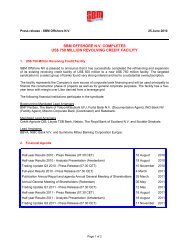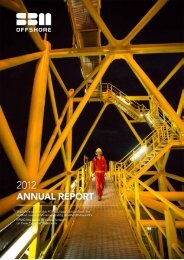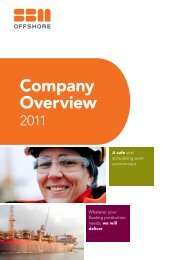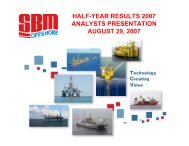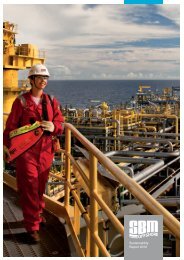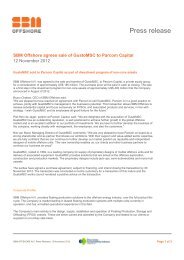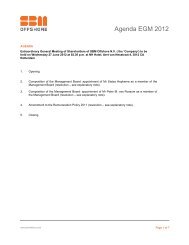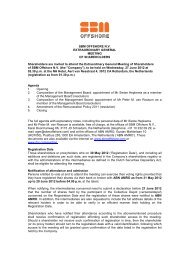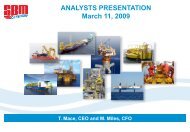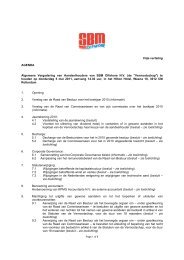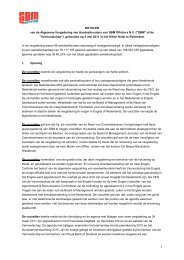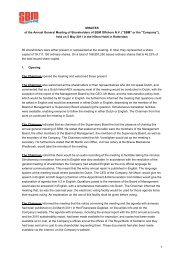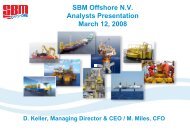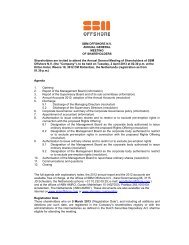Annual Report 2010 - SBM Offshore
Annual Report 2010 - SBM Offshore
Annual Report 2010 - SBM Offshore
You also want an ePaper? Increase the reach of your titles
YUMPU automatically turns print PDFs into web optimized ePapers that Google loves.
Notes to the consolidated<br />
financial statements<br />
General information<br />
<strong>SBM</strong> <strong>Offshore</strong> N.V. is a company domiciled in<br />
Rotterdam, the Netherlands. <strong>SBM</strong> <strong>Offshore</strong> N.V. is the<br />
holding company of a group of international, marine<br />
technology oriented companies. The consolidated<br />
financial statements for the year ended 31 December<br />
<strong>2010</strong> comprise the financial statements of <strong>SBM</strong><br />
<strong>Offshore</strong> N.V. and its subsidiaries (together referred to<br />
as ‘the Company’) and the Company’s interest in associates<br />
and jointly controlled entities as at 31 December<br />
each year.<br />
The Company serves on a global basis the offshore oil<br />
and gas industry by supplying engineered products,<br />
vessels and systems, and offshore oil and gas production<br />
services. The Company has its listing on the<br />
Euronext Amsterdam stock exchange.<br />
Statement of compliance<br />
The consolidated financial statements of <strong>SBM</strong><br />
<strong>Offshore</strong> N.V. have been prepared in accordance with<br />
International Financial <strong>Report</strong>ing Standards (IFRS)<br />
and interpretations, adopted by the EU where effective<br />
for financial years beginning after 1 January <strong>2010</strong>.<br />
The consolidated financial statements are presented<br />
in thousands of US Dollars. The consolidated financial<br />
statements have been prepared under the historical<br />
cost convention except for derivative financial instruments<br />
that are stated at fair value.<br />
These consolidated financial statements were authorised<br />
for issue by the Board of Management on 3 March<br />
2011.<br />
Summary of significant accounting policies<br />
The principal accounting policies applied in the preparation<br />
of these consolidated financial statements are<br />
set out below. These policies have been consistently<br />
applied to all years presented, unless otherwise stated.<br />
Overview of IFRS developments<br />
(a) Standards, amendments and interpretations effective<br />
in <strong>2010</strong>.<br />
Financial Review / Financial Statements <strong>2010</strong><br />
• IFRS 3 (revised), ‘Business combinations’ and IAS<br />
27 (amended), ‘Consolidated and Separate Financial<br />
Statements’<br />
IFRS 3 (revised) introduces significant changes in the<br />
accounting for business combinations occurring after<br />
becoming effective. Changes affect the valuation of noncontrolling<br />
interest, the accounting for transaction costs,<br />
the initial recognition and subsequent measurement of<br />
a contingent consideration and business combinations<br />
achieved in stages. These changes impact the amount<br />
of goodwill recognised, the reported results in the period<br />
that an acquisition occurs and the future reported results.<br />
IAS 27 (amended) requires that a change in the ownership<br />
interest of a subsidiary (without loss of control)<br />
is accounted for as a transaction with owners in their<br />
capacity as owners. Therefore, such transactions will<br />
no longer give rise to goodwill, nor give rise to a gain or<br />
loss. Furthermore, the amended standard changes the<br />
accounting for losses incurred by the subsidiary as well as<br />
the loss of control of a subsidiary.<br />
These changes in accounting policy were applied prospectively<br />
and had no impact on the financial statements<br />
as no transaction occurred during the year <strong>2010</strong>.<br />
• IFRS 5 (amendment), ‘Non-current assets held-for-sale<br />
and discontinued operations’ .The amendment clarifies<br />
that IFRS 5 specifies the disclosures required in respect<br />
of non-current assets (or disposal groups) classified as<br />
held for sale or discontinued operations. It also clarifies<br />
that the general requirements of IAS 1 still apply, in<br />
particular paragraph 15 (to achieve a fair presentation)<br />
and paragraph 125 (sources of estimation uncertainty)<br />
of IAS 1. The change in accounting policy was applied<br />
prospectively and had no impact on the financial statements<br />
as no transaction occurred during the year <strong>2010</strong>.<br />
• IAS 1 (amendment), ‘Presentation of financial statements’.<br />
The amendment clarifies that the potential<br />
settlement of a liability by the issue of equity is not relevant<br />
to its classification as current or non-current. By<br />
amending the definition of current liability, the amendment<br />
permits a liability to be classified as non-current<br />
(provided that the entity has an unconditional right to<br />
defer settlement by transfer of cash or other assets for<br />
at least 12 months after the accounting period) notwithstanding<br />
the fact that the entity could be required<br />
by the counterparty to settle in shares at any time. The<br />
change in accounting policy was applied prospectively<br />
and had no impact on the financial statements as no<br />
<strong>SBM</strong> <strong>Offshore</strong> – <strong>Annual</strong> <strong>Report</strong> <strong>2010</strong> 115


